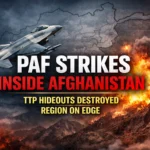Pakistan’s Field Marshal Asim Munir has set off a wave of debate across South Asia after delivering sharp and unapologetic remarks about India during a high-profile diaspora event in Tampa, Florida. His words — touching on nuclear deterrence, water disputes, and economic vulnerabilities — have dominated headlines, particularly in Indian media.
A Storm from Tampa
During his US visit, Munir addressed a gathering of overseas Pakistanis, making statements that left little room for ambiguity. Among the most notable were:
- Nuclear Deterrence Warning – Declaring Pakistan a nuclear nation capable of ensuring that any existential threat would have global repercussions.
- Indus Waters Treaty Red Line – Warning that any unilateral Indian dam projects could be neutralized with force.
- Economic Targeting – Naming India’s Reliance Jamnagar oil refinery — the largest in the world — as a potential strategic target in wartime.
- Symbolic Comparisons – Using a metaphor likening India to a luxury car and Pakistan to a heavily loaded dump truck, sparking social media buzz.
Why Now?
Munir’s timing appears deliberate:
- Post-Conflict Deterrence – Coming just months after the May 2025 India–Pakistan military clash, these remarks reinforce Pakistan’s readiness for full-spectrum defense.
- US Engagement Strategy – Back-to-back visits to the United States, including meetings with top American defense officials, keep Pakistan central to Washington’s South Asia policy discussions.
- Water Diplomacy – By referencing the Indus Waters Treaty, Pakistan is internationalizing water disputes to gain diplomatic leverage.
- Media Visibility – Direct references to Indian infrastructure ensure maximum media coverage, both in the region and globally.
The Strategic Mindset Behind the Words
Munir’s comments suggest a calculated deterrence approach:
- Escalation Signaling – Using strong language to deter India from aggressive actions in Kashmir, water disputes, or economic coercion.
- Counter-Value Targeting – Highlighting India’s economic vulnerabilities to increase strategic pressure.
- Diaspora Mobilization – Speaking overseas allows for more candid messaging, rallying overseas Pakistanis while energizing public sentiment at home.
Potential Benefits for Pakistan
Short-Term Advantages:
- Keeps Pakistan part of Washington’s strategic calculus.
- Strengthens the perception of Pakistan as a key regional security player.
- Enhances domestic support for military leadership.
Medium-Term Gains:
- Builds leverage in water negotiations under the Indus Waters Treaty.
- Reinforces the military’s role in national decision-making.
- Maintains sustained media and diplomatic visibility.
Risks and Drawbacks
- Investor Confidence: Strong nuclear rhetoric may deter potential foreign investment.
- International Scrutiny: Threats against civilian infrastructure could invite legal and diplomatic criticism.
- Escalation Trap: Publicly naming targets increases pressure to follow through in a future crisis.
India and US Reactions
- India: Branded the remarks as “dangerous nuclear posturing” and reiterated its stance on Pakistan being an unstable nuclear power.
- United States: Avoided direct condemnation, stating that its relationships with both countries remain unchanged — but the episode forces Washington to keep South Asia tensions on its radar.
What to Watch Next
Observers are closely monitoring whether:
- Munir repeats similar statements in future addresses.
- Pakistan pushes for international arbitration over Indus water disputes.
- Strategic planning increasingly includes economic infrastructure targeting.
FAQs
Q1: Why did Asim Munir’s comments receive so much attention?
Because they touched on sensitive issues like nuclear deterrence, water security, and targeting major Indian infrastructure.
Q2: Is this the first time a Pakistani military leader has made such statements abroad?
No, but the timing — just months after a military clash — and the specific naming of targets make this notable.
Q3: How could this affect Pakistan–India relations?
It could increase tensions, but it also serves as a deterrence message aimed at preventing conflict escalation.
Q4: What role does the Indus Waters Treaty play in this dispute?
It governs the sharing of rivers between India and Pakistan. Any unilateral project by India is viewed by Pakistan as a direct threat to its water security.
Conclusion
Field Marshal Asim Munir’s remarks in Tampa were not off-the-cuff — they were part of a broader deterrence and strategic signaling effort aimed at both domestic and international audiences.
While the strong rhetoric carries diplomatic and economic risks, it also ensures Pakistan’s strategic relevance remains a topic of discussion in global capitals. Whether this approach translates into tangible diplomatic or security gains will depend on how Pakistan follows up in the months ahead.









